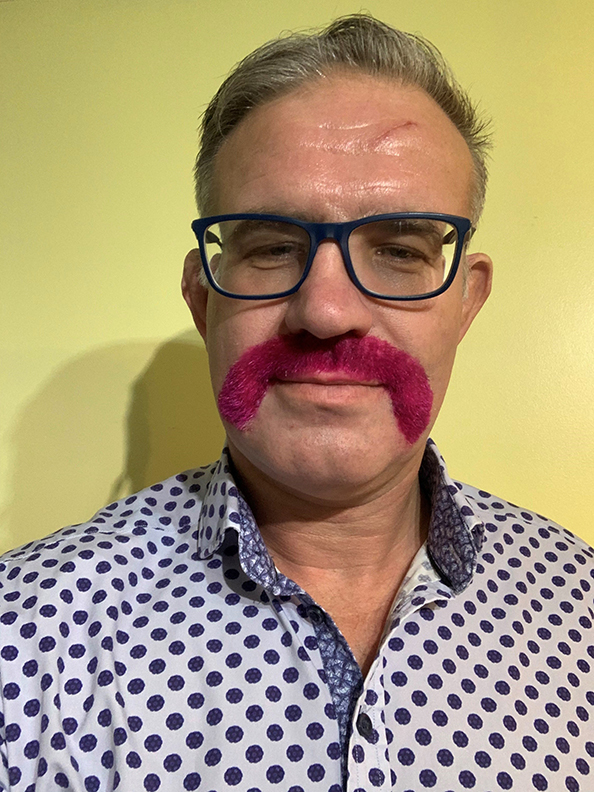Two Parallels

In the last five years or so (and probably, without realising, longer), I have endured periods of mild to moderate depression, and when I’ve explored the different strategies to manage it, a number of them focused largely on identifying and acknowledging a specific event which may have triggered it.
But I couldn’t really pinpoint a particular time or event in my life that may have caused or even contributed to it.

Other strategies suggested to incorporate mindfulness into my life: to be fully present and aware of what’s going on in the moment and what I’m doing, without judgment. The intention is to relax both the mind and the body. The scientist in me however was still confused as to where ‘this all came from’.
In parallel, my own son was curious about some of the thoughts and feelings he had been experiencing and some of the difficulties he was having as he transitioned into his own university life, to the point where he self-diagnosed himself with ADD and related anxiety. In January 2018, I went along with him to see an expert and as the meeting went on, some of the themes discussed felt all too familiar as the consultant confirmed an ADD and anxiety diagnosis. Therefore, in September 2018, I underwent the diagnostic tests myself and somewhat unsurprisingly, it was discovered that I too had ADD. Many of you may not know, but anxiety is a common condition associated with ADD, alongside mild to moderate depression.
Realising all of this made everything full circle for me and although I was never fully conscious of ‘struggling’, it was very clear to me that there are several strategies that I use (and have, without realising, been using for years) to help me.
One of these is always having a busy diary so I’m kept occupied throughout the day. Although this has led to conversations about me ‘always being busy’, I’ve always been happy to shuffle things around to suit others. Coincidently, I recently read something online from someone who articulated the same strategy and I liked the words they used: ‘things become easier to manage when you stop trying to do things the way you feel like you should be doing them (like ‘everyone else’), and start finding ways that work for you, no matter how ‘silly’ or ‘unnecessary’ they seem, especially to me or to others”.’
A key aspect of those experiences is how others’ behaviour can affect you, especially if they don’t know much about you and become frustrated or worse about the ‘silly’ and ‘unnecessary’ things. This can have quite a negative effect, triggering anxiety and making you feel quite bad. So, I think raising awareness and talking more openly is critical.
I think it is fair to say that my feelings were, and remain, somewhat complicated and often confusing about this diagnosis, and I still don’t always find it easy to talk about. However, in October 2021, I read something online that really resonated with me and which has inspired me to write this blog article. The article was about Middlesbrough mayor Andy Preston who revealed he had been diagnosed with ADD a year after his son had received a diagnosis which mirrored my own experiences.
I’ve never personally been a fan of using the terms ‘disability’ and ‘neurodiversity’. Instead, I like to think of it as ‘diverse abilities’, which essentially is what the human race should consist of. To me, ADD is just a string of letters used to describe some of my characteristics. It absolutely does not define me; it is just part of me, and a part that is very much more of a positive than a negative – some describe it as a superpower as per this webpage. I don’t want to steal their thunder, and I will not list everything, however the following features really resonated with me:
- Divergent thinking, creativity, generativity through flexibility of thought, movement, and emotion
- Intuition and connection to emotion
- Perception, observation, curiosity
- Low tolerance for tedium, leading to wanting to try a thousand new things with risk of failure, then doing the one thing everyone else is doing
- Social influence, charisma, and leadership such as tendency to be direct and succinct and say some things that others might not say
- The ability to hold multiple problem-solving tasks and a keen sense for group dynamics due to strong emotional intuition.
I am going to finish by coming back to the point of raising awareness because that is important to the individual but also the folks around them. Without understanding, we might be making it harder for people to be successful. As mentioned earlier, one of the key negative impacts for those with ADD is on their mental health so raising awareness of male mental health conditions is something that’s always been important to me, which is why some of you may have noticed my moustache growth last November and in previous years. I hope that it gets noticed and prompts thoughts on why I do it.
Professor Mark Lewis
Dean of the School of Sport, Health and Exercise Sciences
Any staff member with a physical or hidden disability is welcome to join the Staff Inclusivity Group, which advocates for equality in the workplace for colleagues with physical or invisible disabilities. The group is also a place to seek support from one another and challenge University policies and practices.
Equity, Diversity and Inclusion
Reflections, comments, discussion and opinion on EDI topics from Loughborough University staff and students
Join the discussion
1 Comment
Steve Rothberg
Thanks for sharing, Mark. I think it’s great to hear from colleagues on difficult matters like this and especially valuable from a senior colleague like yourself